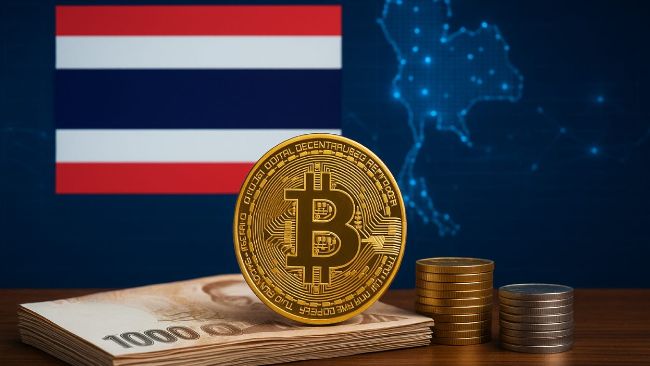Since early 2025, Thailand has advanced its digital asset strategy with a steady series of policy shifts. Each month has seen a new development, from eased regulations to recognition of crypto exchanges and tax reforms. In one of the recent developments, the country has officially launched TouristDigiPay, a program allowing foreign visitors to convert cryptocurrency into Thai baht for local spending.
TouristDigiPay Launches Under Regulatory Sandbox
On August 18, Thailand introduced TouristDigiPay, a regulated scheme enabling tourists to convert crypto into baht for payments across the country. The Securities and Exchange Commission (SEC) announced that the program would operate for 18 months under a regulatory sandbox. It is being co-developed with the Ministry of Finance, the Anti-Money Laundering Office (AMLO), and the Ministry of Tourism and Sports.
Under the framework, foreign visitors can convert cryptocurrency through licensed digital asset firms and e-money providers. Transactions require identity verification under Know Your Customer (KYC) and Customer Due Diligence (CDD) rules enforced by AMLO. Tourists can then use baht balances for electronic payments, mainly via QR codes accepted across Thailand. The system enforces strict limits. Spending is capped at 500,000 baht per month for terminal-based transactions and 50,000 baht for smaller vendors.
Cash withdrawals are only permitted once accounts are closed, and high-risk businesses identified by regulators cannot participate. Officials emphasized that merchants will not receive direct crypto payments. Instead, all crypto will be converted into baht before spending. According to SEC Secretary-General Pornanong Budsaratragoon, the program integrates the digital asset trading system with the country’s e-money infrastructure under the Bank of Thailand.
Tourism Recovery Goals Behind the Rollout
TouristDigiPay arrives at a time when Thailand’s tourism sector faces challenges. Data from the World Tourism Institute showed 16.8 million arrivals in the first half of 2025, down from 17.7 million in the same period last year. Visitors from East Asia fell 24%, with arrivals from China declining 34%.
Officials see TouristDigiPay as part of a wider strategy to modernize the payment ecosystem and attract crypto-friendly travelers. Earlier pilots, including trials in Phuket, prepared the ground for the launch. Authorities expect that digital options for foreign visitors could help increase spending and improve convenience for tourists lacking cross-border payment tools.
The program also builds on consultations the SEC completed in August on using digital assets to stimulate both economic and tourism growth. These discussions informed the sandbox framework and its safeguards against fraud and misuse.
Tax Exemption Frames the 2025 to 2029 Policy Window
Alongside the newly launched TouristDigiPay, Thailand has maintained a strong commitment to a safe crypto space. In June 2025, Deputy Finance Minister Julapun Amornvivat confirmed a five-year capital gains tax exemption on crypto trades via an Embassy press release. The waiver applies to transactions through exchanges, brokers, or dealers licensed under the Digital Asset Business Decree.
The exemption currently runs from January 2025 to December 2029. By limiting eligibility to regulated platforms, the government expects to channel domestic trading toward official venues while deterring offshore or unlicensed markets.
According to the Ministry, the policy is designed to stimulate market activity, attract foreign capital, and build the local digital ecosystem. Officials project that increased investment and consumption could generate around $1 billion in revenue annually.
Finance Ministry Signals Broader Digital Asset Roadmap
Crypto exemption has not been the only positive approach towards a healthy cypto space in Bangkok. In a series of other developments, Thailand’s Ministry of Finance has consistently pushed digital innovation alongside tourism efforts.
Finance Minister Pichai Chunhavajira expressed support for digital assets during a May investment seminar in Bangkok. He urged clear rules that would balance innovation and financial stability. Among the initiatives, the ministry revealed the rollout of “G-Tokens”, blockchain-based investment units allowing retail investors to buy government bonds fractionally.
The tokens aim to improve access for savers and raise Thailand’s profile in global bond markets. Earlier in the year, the SEC approved Tether’s USDT and Circle’s USDC for trading across licensed exchanges. In parallel, officials advanced a tokenized securities system for institutional investors. Together, these reforms have laid the foundation for the TouristDigiPay program.
Regional and Global Comparisons
Thailand’s use of digital assets to boost tourism reflects a wider international pattern. Bhutan has partnered with Binance Pay and DK Bank to let tourists pay through crypto. In the United Arab Emirates, an agreement with Crypto.com enables travelers to pay for flights and in-flight purchases in digital currencies. Meanwhile, U.S. space company Blue Origin signed a deal with Shift4 Payments in August to accept Bitcoin for commercial space travel.
These cases show how governments and corporations are positioning crypto as a tool for tourism and consumer engagement. Thailand’s rollout of the TouristDigiPay project ties together years of regulatory reforms and economic experiments. From stablecoin approvals to bond tokenization and a five-year tax exemption, the government has steadily laid the groundwork for wider adoption.
While the Tourist Wallet remains limited to fiat QR payments, its crypto layer continues in regulatory review. The outcome will determine whether tourists can soon convert digital assets into baht directly. By linking tourism revival with financial innovation as Thailand has joined countries like Bhutan, the UAE, and the U.S. in experimenting with crypto integration.
The rollout marks one of the most visible applications of Thailand’s regulatory approach, which combines innovation with oversight. Officials positioned TouristDigiPay not as an isolated project but as part of broader reforms that include a five-year exemption on capital gains tax from digital asset transactions. Together, these policies highlight Thailand’s effort to strengthen its digital economy and revive a tourism sector facing slowing arrivals.

